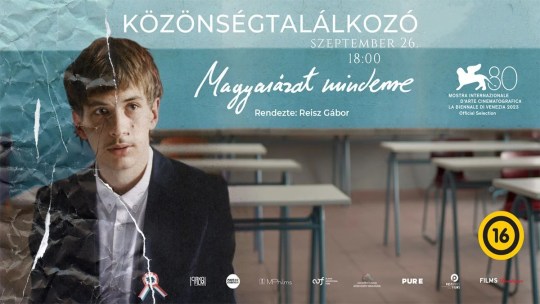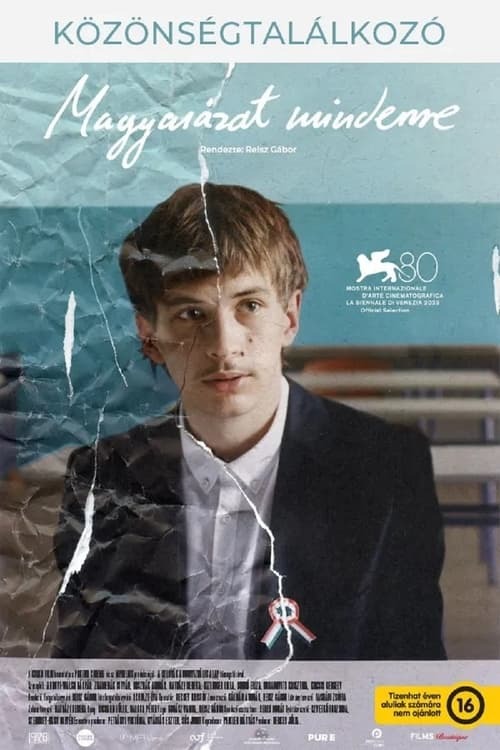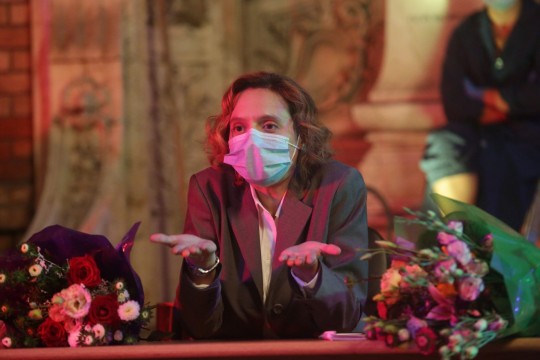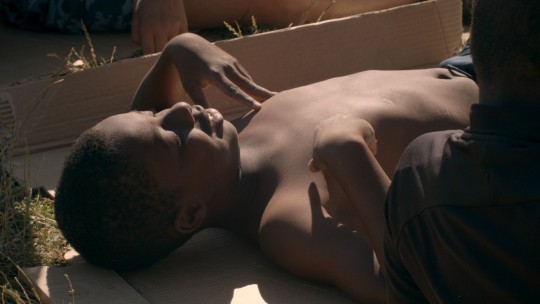#lilla kizlinger
Explore tagged Tumblr posts
Text
youtube
Hippo premieres at Brain Dead Studios on November 16th, at 8pm.
Hippo, a peculiar adolescent, and his Hungarian step-sister Buttercup struggle to come of age in late 1990s America, under the roof of a mother who has been institutionalized at least once.
After the premiere, join us for an engaging Q&A session featuring director Mark H. Rapaport and cast members Kimball Farley, Lilla Kizlinger, Eric Roberts, and Eliza Roberts! Don’t miss this opportunity to hear insights and stories from the creative minds behind the film.
#Kimball Farley#Mark. H Rapaport#Roughhouse Pictures#Kinematics#KinematicsFilm#Eric Roberts#Eliza Roberts#Lilla Kizlinger#Jesse Pimentel#Brain Dead#Brain Dead Studios#Movie#Film#B&W#Film Making#Youtube
4 notes
·
View notes
Text










#rengeteg - mindenhol látlak#forest- i see you everywhere#bence fliegauf#fliegauf bence#fliegauf benedek#hungarian movies#berlin film festival#silver bear#best supporting actress#lilla kizlinger#kizlinger lilla#mihaly vig#víg mihály
0 notes
Video
youtube
"Amíg ez a kormány van vezető szerepben, nincs itt keresni valóm" | Kizl...
Kizlinger Lilla színész, szinházi- és filmrendező. 22 éves, és már mennyi minden van mögötte. Éppen mint Azahriah és Pankotai Lili, mindhárman nagyon fiatalok, és sikeresek. Pankotai L.-t már 12 évesen érdekelte a közélet, a politika. Azahriah is kisiskolásként zenélt. Mindhármuk titka, hogy önazonosak, nem alkudnak meg, és odateszik magukat, sok áldozatot hoznak a céljaikért, és egyikük sem a könnyebbik/kényelmesebbik utat választotta.
2 notes
·
View notes
Text
youtube
HIPPO | Official Trailer | In Theatres November | 2024
Dir: Mark H. Rapaport Star: Kimball Farley / Lilla Kizlinger / Eliza Roberts
1 note
·
View note
Text
Magyarázat mindenre (2023)
Magyarázat mindenre (2023) #GaborReisz #AdonyiWalshGaspar #ZnamenakIstvan #RusznakAndras #HathaziRebeka #SodroEliza Mehr auf:
Explanation for Everything Jahr: 2023 Genre: Drama Regie: Gábor Reisz Hauptrollen: Adonyi-Walsh Gáspár, Znamenák István, Rusznák András, Hatházi Rebeka, Sodró Eliza, Kizlinger Lilla, Urbanovits Krisztina … Filmbeschreibung: In Budapest ist Sommer. Ábel, ein Gymnasiast, sollte sich auf sein Abitur vorbereiten, aber er hat gerade realisiert, dass er in seine beste Freundin Janka verliebt ist.…

View On WordPress
0 notes
Photo

Explanation for Everything de Gabor Reisz

Un film de Gábor Reisz Avec: Eliza Sodró, István Znamenák, Dániel Király, Lilla Kizlinger, András Hatházi, Gergely Kocsis, Adonyi-Walsh Gáspár, András Rusznák, Rebeka Hatházi, Juli JakabSynopsis: Aucune description disponible.
Retrouvez l'article complet ici https://lemagcinema.fr/festivals/internationalfestival/venise/venise2023/explanation-for-everything-de-gabor-reisz/
0 notes
Text
^így! +még annyival kiegészítem, hogy volt idősek otthona ahol simán pár hónapos elmaradásban voltak a bérrel. Kérdeztem a nővért, hogy ezt hogy? S mit fognak tenni? “Mit tehetnénk fiatalember? Itt vannak a lakók!” 😰 Szekunder szégyenérzet+max hivatástudat. Ha nem veszik át ezeket az intézményeket is az egyházak, lassan zárhatják a kapuikat.
(Kizlinger Lilla emellett a filmben nagyon aranyos, bájos🥰)

nagyon cuki film volt….
9 notes
·
View notes
Photo

“Hogyha elmész legközelebb, akkor vagy vigyél magaddal, vagy… Hogy mondjam… Vagy akkor taníts meg engem létezni, amikor nem vagy itt. Azt érzem, hogy… Minthogyha az akkumulátorom mászkálna el, amikor te elutazol.”
Bíró Zsombor Aurél: Mit csináljak, hogy jobban érezd magad | 2022
rendező: Kizlinger Lilla | TÁP Színház
#Kizlinger Lilla#TÁP Színház#színház#Bagossy Bálint#Hajdu Szabolcs#Rába Roland#Bíró Zsombor Aurél#Mit csináljak hogy jobban érezd magad
15 notes
·
View notes
Text
2 notes
·
View notes
Text
Berlinale Film Festival 2021, Industry Event, Day 3
I was hoping to start Day Three off with another shot of highly-caffeinated filmmaking, so I honed in on another genre picture in the Berlinale Special section: Soi Cheang’s LIMBO. Like many other movies before it, LIMBO pairs a veteran cop (Gordon Lam, in good form) with an all-star rookie (Mason Lee) and puts them on the hunt of a serial killer. What makes LIMBO stand out from the rest is that it is shot in beautifully oily, textured black and white.
You can see from the one frame above that the movie is putting in some serious effort on the art design. Every time the cops leave the station, chances are they’re headed someplace that will put them knee deep in garbage. And thanks to the photography and attention to detail, you can practically smell the rotting refuse.
Unfortunately, the story doesn’t quite live up to the imagery. The script, written by Au Kin-Yee (whose previous work includes some co-writing credits on a few Johnnie To films), tries to put a socially conscious spin on the serial killer by making the victims marginalized, societal outcasts. But is this anything new? Aren’t the marginalized always the most vulnerable people? Isn’t an immigrant, junkie or prostitute always on a killer’s most wanted list? What makes it even less compelling is that there’s hardly an interesting motive to the madness. Unlike other grimy, big-city serial killer movies that feint toward social relevance (SEVEN), there’s no clever mastermind behind the killings. In fact, there’s any number of other cases that could have brought a pair of cops into these squalid environments and face-to-face with the city’s forgotten people. And maybe the plight of these people wouldn’t have felt so shoehorned into the story.
More interesting is the movie’s recurring theme of lost limbs. Yes, the title “Limbo” is a bit of wordplay, as many people in the movie are losing one appendage or another — sometimes by accident, sometimes through the use of a rusty, blunt tool. It’s a nice gory little motif that the movie makes hay out of, but again, it doesn’t go anywhere. As it turns out, this amputation fetish is the only interesting character detail that the movie bothers to give the killer. Otherwise, all we have is a standard, anonymous, non-speaking brute out of an 80s slasher movie. Perhaps most frustrating of all is that the film makes a step toward giving the killer a bit of sympathy early on, only to follow it up with some unnecessarily degrading action that stomps out that angle completely. What’s more interesting: watching police chasing after a faceless, voiceless, unsympathetic killer, or watching police being outwitted by a smart murderer who’s revealed to have some sort of messed up moral compass in place?
I wouldn’t go so far as to say LIMBO is a bad movie, just a frustrating one. There are some good intentions in here, and the movie looks fantastic, but if they’d put a bit more effort into creating a killer worthy of all the fuss, we’d be looking at a great addition to the genre. Oh, and the extremely hackneyed ending, which tries to pass itself off as tragic, doesn’t win it any points, either.
The second film of the day brings us back to the Competition section, and it was an extremely pleasant surprise. In fact, it was one of the best surprises of this year’s Berlinale (so far). With his second feature-length film, WHAT DO WE SEE WHEN WE LOOK AT THE SKY?, Georgian writer/director/editor Alexandre Koberidze establishes himself as an auteur with a strong and poetic vision for cinema.
Early on, I couldn’t help but flash on AMÉLIE. The two films have a few things in common: a narrator who gives the proceedings a fairy tale aspect, inanimate objects imbued with special powers, a will-they/won’t-they love story that starts on a chance encounter, a story that is as much focused on a neighborhood community as it is the two central characters… and yet WHAT DO WE SEE is a much different film. For starters, it’s far less manic. This is a very leisurely-paced film. One that lingers on people in cafés and sidewalk kiosks. One that likes to make digressions, like getting into the heads of some local dogs as they make plans on where to meet up during the football match. It also goes to some more supernatural places that other “whimsical” movies only hint at.
Some people will surely find the pace, the two-and-a-half hour running time, and the many diversions to be a problem. But I loved every minute of it. Both the pace and the running time achieve a certain purpose in immersing you in the local rhythms of Kutaisi, Georgia. At one point, we’re treated to an extended slo-mo sequence of kids playing football set to an anthemic pop song. It’s perhaps the most magical moment of the festival (so far).
There are many smaller moments like this throughout the film. They don’t move any plot along, necessarily, but each one feels like an important part of this universe we’re exploring — and that’s more to the point of the film. Alexandre Koberidze achieves something that few movies are capable of, which is making you see the world around you in a different way. More than telling a romantic story about two strangers, this is a film that makes the everyday feel magical, without any special effects or flashy camerawork. With patience, and a masterful yet deceptively simple use of sound and imagery, it turns the commonplace into profound delight. In this way, it’s shares a certain sensibility with Day One’s INTRODUCTION.
I’m not an expert on Hungarian cinema, but it’s safe to say that it can sometimes be described as unrelenting in its bleakness. Certainly, Day Two’s NATURAL LIGHT fits this description, as does FOREST - I SEE YOU EVERYWHERE. In some cases (again, see NATURAL LIGHT, or the films of Bela Tarr), this bleakness can be well-balanced by the poetics of imagery and pacing. In other cases, like this film, the darkness can simply wear you down.
A sequel of sorts to his 2003 film FOREST, this is a collection of short stories dealing with death and despair in Budapest. It’s well-acted and shot in an interesting way. The camera is always on the move, eager to cut to a close-up of someone’s hand, a gesture, a nuance. But it’s all very intense and agitated. There’s very little in the imagery and pacing to balance out the never ending bleakness, and it left me exhausted (and not in a good way).
What bothered me most about the movie, is that I kept wondering why the film didn’t take advantage of its short story structure. Why is each story hitting the same note? Why isn’t it using this opportunity to explore its themes with different tones — to build and release tension — to change things up even just a little bit? (Tomorrow, we’ll get into this again when WHEEL OF FORTUNE AND FANTASY does exactly this with its short story structure.)
Actress Lilla Kizlinger won the Silver Bear for Best Supporting Actress, and it’s a deserved win. In the first story of the film, she gives what is essentially a harrowingly personal PowerPoint presentation to her father. It leads to an icy argument and a central point to the film: that life has a way of handing you situations where there are no easy answers or good outcomes, just different ways of coping. Without doubt, it’s a strong opening, but I can’t say the film builds or improves upon it during the 100 minutes that follow.
Day Three was put to rest with one of the strongest films in the Competition section, PETITE MAMAN, Céline Sciamma’s follow-up to PORTRAIT OF A LADY ON FIRE. Like MEMORY BOX, this is another film about a mother and her daughter, and the unusual manner in which they come closer together. Only this time, instead of a teenager looking at her mom’s old journals and photographs, we have an eight-year-old daughter getting a chance to talk and play with her mom when she was her age. That premise may sound touching and appealing, but the film is even more thoughtful and impactful than you’d expect.
PETITE MAMAN is also like SOCIAL HYGIENE in that it stems from an idea that emerged before lockdown, but is perfectly suited to the restrictions of a pandemic. It takes place in a remote location, there are approximately five actors in the film, two of them are children and the others mostly appear in scenes opposite those kids. But it hasn’t been limited by the restrictions. Sciamma has lovingly handcrafted the movie’s surroundings — the countryside cottages, a woodland hut, the scenery and costumes used when kids put on a show — and every detail feels perfectly right.
I won’t spoil much more about the movie. There is a time travel element to it, but it’s mostly a movie about a child coping with the loss of a family member, and getting a chance to visit the past, spend some more time with the loved one, as well as with her mom, who’s grown a bit elusive in the present day. In doing so, the child gets a better understanding of life and death, how and why people change over time, and the importance of the memories we carry with us. All this, despite being a movie that you could (and maybe should) watch with your own kids at some point. It is perhaps one of the most sophisticated family movies ever made.
None of this would work without Joséphine Sanz, who plays the time traveling kid Nelly, and Gabrielle Sanz who plays her mom as a child. This duo of sister actors are fascinating in their scenes together. They not only seem to have a genuine understanding of the meaning of the work their doing, they’re utterly believable in everything they do, which includes acting out improvised scenes from made-up detective stories. You could look at these play-acting scenes as just two kids having fun, but there are multiple layers going on there as these are the moments when Nelly is really getting closer to understanding who her mom is as an individual. It’s really some beautiful stuff. I wouldn’t be surprised if this becomes a classic family movie that future generations will grow up with and return to time and again. It’s a movie that has some things to teach us.
Ok for now. Tomorrow: a tragedy in Iran, a trifecta in Japan, and a psychedelic trip through Hawaii.
1 note
·
View note
Text
Berlinale 2021 - Award Winners
Berlinale 2021: The Award Winners of the Competition
Golden Bear for Best Film: Babardeală cu bucluc sau porno balamuc (Bad Luck Banging or Loony Porn) by Radu Jude

Silver Bear Grand Jury Prize: Guzen to sozo (Wheel of Fortune and Fantasy) by Ryusuke Hamaguchi
Silver Bear Jury Prize: Herr Bachmann und seine Klasse (Mr Bachmann and His Class) by Maria Speth
Silver Bear for Best Director: Dénes Nagy for Természetes fény (Natural Light)
Silver Bear for Best Leading Performance: Maren Eggert in Ich bin dein Mensch (I'm Your Man) by Maria Schrader
Silver Bear for Best Supporting Performance: Lilla Kizlinger in Rengeteg - mindenhol látlak (Forest - I See You Everywhere) by Bence Fliegauf
Silver Bear for Best Screenplay: Hong Sangsoo for Inteurodeoksyeon (Introduction) by Hong Sangsoo
Silver Bear for Outstanding Artistic Contribution: Yibrán Asuad for the editing of Una película de policías (A Cop Movie) by Alonso Ruizpalacios
Berlinale 2021: Awards of the Encounters Section
Best Film: Nous (We) by Alice Diop

Special Jury Award: Vị (Taste) by Lê Bảo
Best Director (ex-aequo): Das Mädchen und die Spinne (The Girl and the Spider) by Ramon Zürcher, Silvan Zürcher
Best Director (ex-aequo): Hygiène sociale (Social Hygiene) by Denis Côté
Special Mention: Rock Bottom Riser by Fern Silva
Generation Kplus and 14plus: The Awards of the International Jury
Grand Prix for the Best Film in the Generation Kplus competition for Han Nan Xia Ri (Summer Blur) by Han Shuai and a Special Mention for Una escuela en Cerro Hueso (A school in Cerro Hueso) by Betania Cappato.
Grand Prix for the Best Film in the Generation 14plus competition for La Mif (The Fam) by Fred Baillif and a Special Mention for Cryptozoo by Dash Shaw.
0 notes